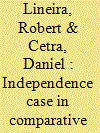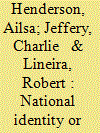| Srl | Item |
| 1 |
ID:
138883


|
|
|
|
|
| Summary/Abstract |
Scotland is not the only sub-state unit in Europe where relevant political actors make claims for independence. To generate insights on these independence demands, we compare the drivers, arguments and popular support for secession in Scotland, the Basque Country, Catalonia and Flanders. We argue that national identity, party politics and the economy are behind the independence requests, and the exact articulation of these elements varies from case to case. Currently, the most salient of these demands are the ones from Catalonia; Basque demands for self-determination are less prominent than in the past, whereas the demand for a vote on independence is much less articulated in Flanders. Although the Scottish independence referendum has set a precedent for solving independence disputes, we argue that the possibilities of exporting the Scottish referendum experience to other realities are limited.
|
|
|
|
|
|
|
|
|
|
|
|
|
|
|
|
| 2 |
ID:
111574


|
|
|
|
|
| Publication |
2012.
|
| Summary/Abstract |
The article tackles some of the questions that arise from the invocation of "the people" in independence referendums in a contextualized way by examining the constitutional experience of two independence referendums: Quebec's unsuccessful independence referendum in 1995 and Montenegro's successful one in 2006. I argue that democratic theory does not presuppose the unified people as a decision-making unit, but rather that it conceals two, more logically primitive-and to an extent conflicted-general conceptions relevant to independence referendums. While not arbitrating between them, the concluding part argues that the tension in democratic theory ought to, at a minimum, contribute to reducing the vehemence of nationalist politics involved in attempts to achieve political independence.
|
|
|
|
|
|
|
|
|
|
|
|
|
|
|
|
| 3 |
ID:
138884


|
|
|
|
|
| Summary/Abstract |
This article analyses political attitudes to the union in England, Scotland and Wales after the Scottish independence referendum. Using public opinion data, we explore constitutional preferences and perceptions of national grievance, before examining the role that national identity plays in structuring preferences. Our evidence shows that considerable demand exists for nationally demarcated forms of government within the UK, although these constitutional preferences do not translate in support for policy diversity across the UK. We also find evidence that these constitutional preferences relate closely to national identity, but relate also to appeals to national interest.
|
|
|
|
|
|
|
|
|
|
|
|
|
|
|
|